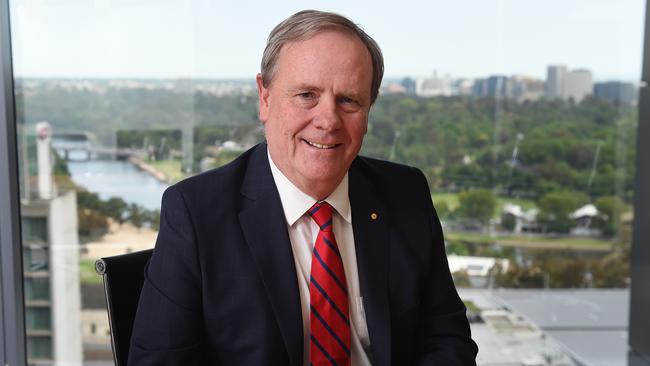Hold RBA to account on inflation, Future Fund’s Peter Costello says
Handing down an annual loss, Peter Costello has called on the government to make the RBA accountable over its handling of monetary policy.

Future Fund chairman Peter Costello has called on the federal government to make the Reserve Bank accountable over its handling of monetary policy in relation to its inflation target as prices accelerated in response to the unprecedented stimulus during the Covid-19 pandemic.
While announcing an annual loss as asset prices tumbled after central banks began lifting interest rates, Mr Costello said the RBA should face “consequence” for its actions.
“We do have to think about mechanisms to make sure that the central bank is held to account,” Mr Costello said after the Future Fund reported a 1.2 per cent loss for the year to June 30.
“If it’s got a target for 2-3 per cent inflation, it should be held to account, and if it doesn’t deliver, there should be some kind of consequence.”
His comments come after the government commissioned a review of the central bank by an independent panel of experts, which is due to report make recommendations by March.
While acknowledging that fiscal policy was also loosened during the pandemic, Mr Costello said the RBA had a “pretty narrow focus” to keep inflation at 2-3 per cent.
“So whatever’s going on in the general economy, it should be focused on delivering that outcome,” said the former treasurer.
“It’s not responsible for coronavirus or anything else. I’m not pretending the government didn’t make any mistakes … but even in that very narrow area, which is where the RBA operates … it made the failure worse, because it had a focus and a very limited and specific area of responsibility.
“When (the RBA) got into the Covid thing and started giving forward guidance … and (Philip Lowe) says ‘Oh well, it was a crisis and I had to do what I could’ … but if you’d relied on the guidance, you would be in a terrible state now – the guidance was wrong.”
Mr Costello said he was glad the Future Fund didn’t rely on the RBA’s guidance that its inflation preconditions for a rise in the cash rate wouldn’t be met before 2024.
“I’m very glad we didn’t, we’d be in a terrible position today, but there are some young homeowners that might have, some investors might have, and it didn’t do them much good,” he said.
“I think it’s the right target, and at the end of this inquiry, I hope they continue it,” Mr Costello added. “You’ve still got to hold people accountable for executing to the target.”
In a portfolio update, Mr Costello said the Future Fund “successfully navigated substantial market falls”, and its small loss was a “pleasing outcome” considering the magnitude of those falls.
Total funds managed by Australia’s sovereign wealth fund shrank by $7bn – or 2.8 per cent – to $242bn in the three months to June 30 amid a volatile period in which shares, bonds and commodity prices dived amid aggressive tightening of monetary policy by central banks and the rising risk of recession.
Future Fund chief executive Raphael Arndt said he was confident in the valuation of the fund’s unlisted exposures after an “incredibly volatile” quarter.
“In our case, that’s why we waited until we had all the audited results across the whole portfolio,” Dr Arndt said. “Our private equity portfolio is written down 5-10 per cent, just in the June quarter.”
“When we look across our portfolio, of course some of the big, high-profile, listed tech companies have fallen more than that.
“They are very mature companies – they’re not profitable or yielding cash, but they’re large, self-funding companies, so they tend to be much more volatile than earlier stage private equity, or growth private equity, which is the bulk of our portfolio.
“We feel that our valuations reflect the market. Having said that, it’s natural that for all private-market assets there does tend to be a bit of a lag and a smoothing effect. We’re confident that the writedowns are appropriate and have been taken into account.”
Dr Arndt said the fund saw similar trends in the value of its property and private debt investments, which were “written down by about half” of the 5-10 per cent writedowns seen in private equity.
The Future Fund’s loss came after it recorded a record return of 22.2 per cent in fiscal 2021 due to a “period of exceptional stimulation through monetary and fiscal policy”, Mr Costello said.
“Not unexpectedly, we now have significant global and domestic inflation. Central banks are responding by tightening policy, and it is likely that further interest rates rises will be needed to achieve their inflation objectives.
“We expect that deglobalisation, geopolitical tensions, trade barriers and high inflation will be a feature of the investment climate going forward.”
However, the Future Fund had been “carefully assessing the changing investment environment and positioning the portfolio accordingly” and “this flexible approach has helped to protect the fund from market losses”.
Created to strengthen the commonwealth’s long-term financial position, the fund has achieved a 10-year return of 9.7 per cent per annum against a target of 6.6 per cent.
But the Future Fund’s target rate of return, of at least the CPI plus 4-5 per cent per annum over the long term, would be “extremely difficult to attain” while inflation was high, Mr Costello said. “In fact, in the current environment, you just won’t do it.”
Much of the significant single digit (percentage) writedowns in its infrastructure investments in fiscal 2021 were written back in fiscal 2022 due to a strong economic rebound, he added.
“Our infrastructure portfolio is very carefully crafted to give us Australian inflation exposure … so we actually delivered strong double-digit returns out of that portfolio this year,” Mr Costello said.



